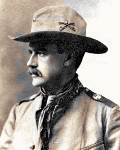JOHN
AVERY McILHENNY
Eldest
son of company founder Edmund McIlhenny served under future President
Teddy Roosevelt in the "Rough Riders"

Thursday, September 2, 2004
Page 11
REMINISCING (Column)
Louisiana High Court: McIlhenny Libeled Rival ‘Tabasco’ Maker
By ROGER M. GRACE
“The devil made me do it” is an age-old excuse by someone who’s dodging blame. John Avery McIlhenny, as head of the Tabasco Sauce company founded by his father, came up with a like defense for having lied in connection with a 1905 trademark application—saying, in essence, “My lawyer made me do it.”
That didn’t sit well with the Louisiana Supreme Court.
The trademark “Tabasco” had been yanked by the commissioner of patents based on the falsity of McIlhenny’s declaration, and that action was upheld in 1910 by the U.S. Court of Appeals for the District of Columbia. This weighed heavily against E. McIlhenny’s Son in a case decided by the Louisiana tribunal in 1912.
In New Iberia Extract of Tabasco Pepper Co., Limited, v. E. McIlhenny’s Son, 132 La. 149, the court reversed a judgment for the defendant McIlhenny company in a libel case. The action was based on a circular the company disseminated in 1906. Brandishing the trademark it had registered three months earlier, it disparaged the rights of other hot sauce-makers to use the word “Tabasco,” theatening litigation against any dealer who sold such assertedly infringing products.
The New Iberia company, which manufactured “Extract of Tabasco Pepper,” filed its action for libel June 25, 1907.
How did McIlhenny defame New Iberia or any of the other competitors who were using the word “Tabasco”? At the time it sent out its July 17, 1906 circular headed “E. M. McIlhenny’s Son v. Infringers,” the word “Tabasco” was, indeed, a registered trademark, as it claimed.
The Louisiana high court treated the trademark as if it had not existed, in light of it having been procured through a false representation.
McIhenny’s lie was that his company, exclusively, had used the word “Tabasco” on hot sauces for the preceding 10-year period. As discussed last week, that statement, if true, that would have conferred a lawful basis for registration under the 1905 federal Trade Mark Act.
The special defense was proffered in the libel case that John Avery McIlhenny had acted in good faith because he relied on the advice of counsel. It seems that a lawyer gave him a choice of signing Declaration “A,” which made no mention of use by others of the name “Tabasco,” and Declaration “B” which did. McIlhenny signed Declaration “A.”
The Louisiana high court’s opinion said:
“The affiant had his choice between the two declarations, and elected to verify the one which affirmed ‘actual and exclusive use’ in the defendants since 1868. Such use was a matter of fact, and on its verification the defendants obtained the registration of their trade-mark. If the real facts had been disclosed, the application for registration would have been rejected. No amount of legal advice will excuse a suppression, or misrepresentation, of the facts of a case. The client is responsible for the truth of facts by him verified, and advice of counsel will not shield him from statements that are not true.”
The opinion also said that “[a]s a matter of law, the exclusive right, if any, of the defendants to use the name ‘Tabasco,’ expired with their [1870] patent in the year 1887.”
The Louisiana Supreme Court set the damages, itself, at $5,000.
It was no doubt of little consolation to the McIlhennys that they had won a minor battle earlier that year in the United States District Court for the Eastern District of New York, in McIlhenny v. Hathaway, 195 F. 652. Plaintiff Mary McIlhenny (widow of company founder Edmund McIlhenny) sought to enjoin the sale of a Tabasco sauce that was either a genuine McIlhenny brew obtained by fraud and bottled by the defendants, or was a counterfeit substance.
The court having previously granted a preliminary injunction, now overruled a demurrer and ordered entry of a permanent injunction “unless the default be opened and proper answer be interposed within 10 days.”
That victory was sweet—but overshadowed by the fact that the highest court of the very state in which the McIlhenny family’s operations were headquartered ruled that anyone could market a hot sauce called “Tabasco.” That would have seemed to have ended the matter. But it didn’t. A determined lot, the McIlhennys persisted in their quest to gain the exclusive right to the word “Tabasco.”
They prevailed in a case I’ll discuss next week.
Before signing off, I should note the occupation of the truth-bending McIlhenny when he wasn’t running the family business. He was a politician.
|
JOHN
AVERY McILHENNY |
|
|
McIlhenny served in the Louisiana House of Representatives from 1900-04 and the state Senate from 1904-06. Before that, he was a second lieutenant in Teddy Roosevelt’s Rough Riders, and for some years after that served as a member of the U.S. Civil Service Commission.
Copyright 2004, Metropolitan News Company
CLICK HERE for the next column on Tabasco Sauce
MetNews Main Page Reminiscing Columns